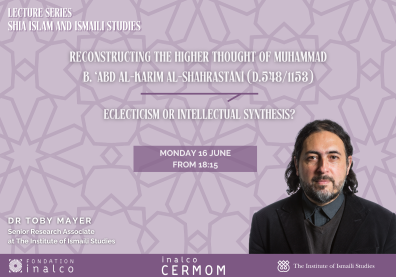Reconstructing the Higher Thought of Muhammad b. 'Abd al-Karīm al-Shahrastānī (d.548/1153): Eclecticism or Intellectual Synthesis?

During the course of his career, Shahrastānī engaged at a high level with Ashʿarism, Avicennism and Ismailism. His heresiography, the al-Milal wa'l-Niḥal, is a largely neutral exposition of religious and philosophical teachings worldwide, and his Nihāyat al-aqdām fī ʿilm al-kalām is an in-depth presentation of neo-ashʿarī dogmatic theology. Three separate works then provide a window into what might be considered his "higher thought", namely his Muṣāraʿat al-Falāsifa, his Majlis-e maktūb-e munʿaqad dar Khwārazm(Khwārazmian sermon), and his incomplete commentary on the Qurʾan. Here we can see a world of ideas that, on the whole, offer a new vision of his intellectual positioning. In areas as diverse as cosmology, philosophy of time, philosophy of action, prophetology, eschatology, noetics, etc., the reader discerns aspects of all Shahrastānī's intellectual influences: Ashʿarism, Avicennism and Ismailism. Do these coexist and form a unity, an ultimate Shahrastānian philosophy, or are they merely an eclectic mix?
Dr. Toby Mayer is Senior Research Associate at the Institute of Ismaili Studies. After completing his studies at Cambridge (BA/MA) and Oxford (MPhil. and DPhil.), Toby taught at SOAS, University of London, before joining the IIS. He worked with the late Professor Wilferd Madelung on Shahrastānī's Muṣāraʿat al-Falāsifa (IB Tauris and IIS, 2001), on Ibn al-Walīd's Ismaili interpretation of the Qaṣīdat al-Nafs attributed to Avicenna (IB Tauris and IIS, 2016), and on Maslama al-Qurṭubī's Rutbat al-Ḥakīm (forthcoming). The second of three volumes of his translation and study of Shahrastānī's commentary on the Qur'an is forthcoming (Oxford University Press in association with IIS, 2025).